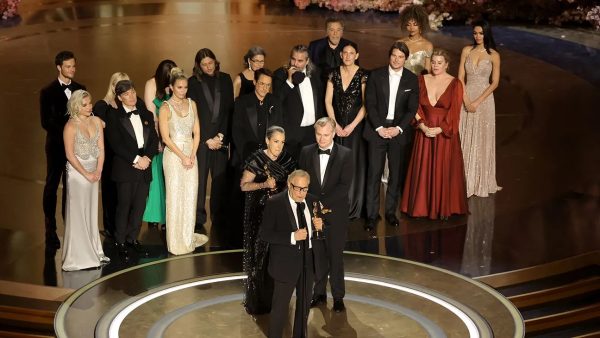South Korean drama “Squid Game” is a hit
A dramatic critique of South Korean society, “Squid Game” grows in popularity
October 14, 2021
Netflix has done it again. The smash hit “Squid Game” has taken the internet by storm this past month, and it just might become the most popular Netflix show of all time. As to be expected of any media that has garnered this much renown, there is a multitude of factors that make it must-watch television.
The action drama follows the events of a single week, where drifters on the fringe of society who have racked up overwhelming amounts of debt partake in a series of children’s games to earn money. The catch: only one person can escape the games alive.
There is something refreshing and immersive about watching a cast composed entirely of unknown actors and actresses. Perhaps the Korean drama has seen so much success in front of American audiences because each face on the screen is entirely new. This helps break down the barrier between television and real life.
Like the contestants on the show, the audience is introduced to a group of strangers, trying to make sense of all of the chaos and confusion. When I watch a movie like “Lady Bird”, I say to myself, “Hey! There’s Timothée Chalamet from x,y and z,” and it becomes difficult to see him as the character he is attempting to portray. There is no such dilemma with “Squid Game”.
Not only is the cast unfamiliar, but they are also exceptionally talented. I found myself emotionally invested in so many characters because they felt like people I would encounter in real life.
The genius of the show lies in its ability to set up a terrifyingly real situation against the backdrop of aesthetically palatable children’s games. The bright, pastel scenery creates a relentlessly eerie atmosphere that compliments some truly stellar performances. Moreover, the universally celebrated ethereal beauty of HoYeon Jung doesn’t exactly hurt ratings, either.
One place where “Squid Game” really shines is in its character development. Aside from the central protagonist, Seong Gi-Hun, there aren’t really any ‘main characters.’ The line between main character and supporting character is blurred to the point where the two are no longer distinguishable. Instead, each contestant’s story develops organically. I love this component of the storytelling because it heightens the suspense and keeps the audience engaged. You never know who is going to survive the next round.
Furthermore, the writers occasionally lean into stereotypes, but never actually follow through on them. Each contestant continues to develop and evolve throughout the show, making them feel much more real and personal to the audience. For example, there is the cut-throat businessman; a thug; and the wise, old man, but the writers push boundaries and take chances. Each character contains many layers which display different aspects of their humanity.
Despite being written in 2008, “Squid Game” remains extremely topical. In a time where economic inequality continues to expand, Hwang Dong-hyuk’s tale is a reminder that this issue is a global one, and it will only get worse if left unchecked. On the internet, many have taken up a defense for the squid games, arguing that the contestants chose to play the game, and therefore, have no one to blame but themselves for their fate. These discussions are amusing because they unintentionally bolster the message that the show is trying to convey.
If you have not yet tuned in, you should definitely give “Squid Game” a try. I recommend watching the original Korean version, with English subtitles for the full experience of the tone and mood. It’s an exciting story with exceptional pacing. Plus, everyone else is talking about it, you might as well join the conversation.























